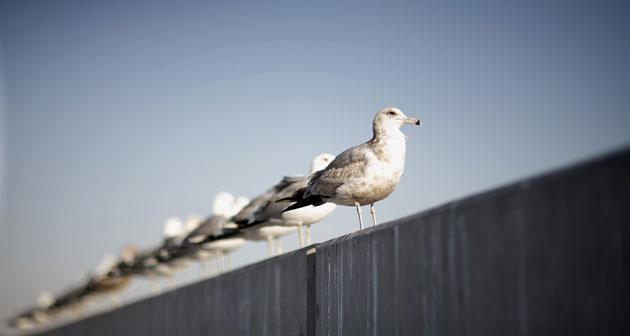TOP STORIES Queensland oil spill: saving wildlife from a man-made disaster
Queensland oil spill: saving wildlife from a man-made disaster
The Daily Telegraph (source: news.com.au - www.news.com.au)
14 Mar 09
G Green
Location: Queensland, Australia - Map It 
IT'S a delicate job - painstakingly wiping deadly oil from the tiny claws of ghost crabs, degunking pelicans' necks and bills and cleaning the scaly skin of a venomous sea snake.
Yesterday volunteers, wildlife carers and two of the Sunshine Coast's biggest tourist attractions combined to save creatures great and small from the toxic oil spill which has coated sections of Queensland beaches and rocky headlands from Noosa to Caloundra.
Meanwhile, hard questions were being asked as to how the disaster could have happened. The Hong Kong-flagged cargo ship responsible has been detained and its owners could face $2 million in fines.
Automatic Manitoba elk cull irks wildlife federation [bovine tuberculosis]
Calgary Herald - www.calgaryherald.com
12 Mar 2009
K Rollason
The Manitoba Wildlife Federation is upset about a Parks Canada program to shoot elk first — and get answers later — for bovine tuberculosis.
After several years of capturing elk and killing them only after an initial blood test proved they had TB, Parks Canada is now in the process of shooting 50 in a known TB hot spot in Riding Mountain National Park, located in southwestern Manitoba, and then testing the carcasses for the disease.
Parks Canada is also culling another 50 deer using the same method, as well as increasing the number of elk it captures, puts a radio collar on, and captures again to kill, only if blood tests come back positive for TB.
>>> Man to pay $250,000 for importing deer
 Heavy Metal Pollution Hits Wildlife Hardest
Heavy Metal Pollution Hits Wildlife HardestDiscovery Channel - dsc.discovery.com
12 Mar 2009
A Salleh
Location: Australia - Map It

Lead and cadmium found in the hair of wildlife are revealing they are at higher risk from heavy metal pollution than humans, say experts.
Christopher McLean of the University of Wollongong in Australia and colleagues report their study of Australian wildlife in the vicinity of a former lead/zinc smelter, in the journal Science of the Total Environment.
"These two metals accumulate in the hair of animals," said McLean, who did the research while at the University of Newcastle, also in Australia.
Cited Article
Park Service Release Sparks Firey Reaction
MetroNews Outdoors - www.wvmetronews.com
12 Mar 09
C Lawrence
An out of the blue announcement this week by the National Park Service created a national stir. Acting NPS Director Dan Wenk announced, in a vague press release from the headquarters in Washington, the park service is going lead free.
"Our goal is to eliminate the use of lead ammunition and lead fishing tackle in parks by the end of 2010,” Wenk stated in the release. “We want to take a leadership role in removing lead from the environment.”
The misleading content of the press release hit like a bombshell with sportsmen's and conservation groups across the country and here in West Virginia. However, St. Albans, West Virginia native David Barna, chief of Public Affairs for the National Park Service, attempted to allay those fears saying it's not a rule change at all, but rather an in-house decision.
LAST WEEK'S TOP READ LINKS
- First Jaguar Caught in U.S. Put to Sleep
- Host culling as an adaptive management tool for chronic wasting disease in white-tailed deer: a modelling study [journal article]
- Invasive Parasite Spreading Among West Coast Estuaries
- For Seals On Facebook, 'It's Complicated'
- Malaria Drug Is Found to Curb Deadly Infections Spread From Animals
- Sea Otters Can Hold Hands[shamelessly cute video]
- Should hunters switch to 'green' bullets?
- Bee parasite devastates colonies as hives go unregistered and uninspected
- Decline Of Shorebird Linked To Bait Use Of Horseshoe Crabs
- Worldwide She-Male Fish Mystery Widens
OTHER WILDLIFE HEALTH RELATED NEWS
Photo courtesy of The Guardian
 The week in wildlife [image gallery]
The week in wildlife [image gallery]- Discovery of new coral species unlocks millenia of climate data
- Commonwealth warns of disease outbreaks in goldfinch, bats [includes video 2 min 7 sec] [Rockbridge County - Map It
 , Bedford County - Map It
, Bedford County - Map It , and Floyd County - Map It
, and Floyd County - Map It , Virginia, USA]
, Virginia, USA] - Ecology Increases Spill Damages Range
- County's first 2009 rabies case reported [Salem County, New Jersey, USA - Map It
 ]
] - Navy finalizes plans for stranded marine mammals
- Tidal wave of trash threatens world oceans
- Beyond the Frontier: The Ecology of Disease [podcast from Oct 2008][Cited article - Causal inference in disease ecology: investigating ecological drivers of disease emergence. Frontiers in Ecology and the Environment: Vol. 6, No. 8, pp. 420-429]





No comments:
Post a Comment